Good Planning Makes Better Threaded Holes
Hole making is as common an operation as exists in metalworking. Tapping those holes is also very common. Finding a way to get quality threads and using efficient processing are ongoing jobs for this Indiana shop.
Share





Blessed with a core of good customers and a steady work flow, Apex Precision Technologies (Indianapolis, Indiana) chose not to simply sit back and enjoy. Rather, the shop works very hard at continuously optimizing each and every metalworking process on the floor. That has been especially true for drilling and tapping operations performed on the hundreds of holes that are required in the workpieces that pass through this shop daily.
This 50-person shop measures success by producing high quality threads faster than previous processes and increasing the relative tool life of the cutters doing the work. Net result for the business is better throughput of customer parts. Delivery is an important metric because the shop operates much of its production around a Kan Ban system of inventory control.
Apex Precision is a 50-year old business. Its original location in downtown Indianapolis was outgrown 2 years ago and was replaced with a custom built facility outside of Indianapolis proper.
Early success for the shop came as a prime supplier to the aerospace industry, specifically jet engine manufacturers including Allison—which is now Rolls Royce—and GE jet engines. The shop continues to supply workpieces to the aerospace industry.
In addition, Apex has grown the business into supplying the off-road, tractor and fork lift truck manufacturing industry. Serving these industries gives Apex broad experience machining a variety of materials. The business model is part production shop and part job shop.
Cast iron is the bread and butter material for the production side of the business with off-road and fork truck part production representing about two-thirds of the business volume. However, aluminum, titanium, Inconel, Hastelloy and other exotics are a vital part of this shop's processing skill set for the smaller lot size aerospace business.
Apex has had a great deal of success with hole-making and tapping operations. The shop has worked to refine the drilling and tapping operations to reap some very good tool life results. Dan Seacat, manufacturing engineer, explains how.
An Environment For Improvement
Like many shops, Apex has seen an increased reliance by its customers on vendor supplied engineering expertise. "We are asked to do more of the engineering for customer workpieces," says Mr. Seacat. "Our input extends not only to the process engineering side that involves job layout and manufacturing, but also to having a voice in some of the design issues. Our customers want and need the metalcutting expertise we can bring."
While some of Apex's customers deliver raw castings for machining, the shop has seen an increase in jobs that require the shop to start with a part drawing. In those cases, the shop takes the CAD drawing file to a foundry and acts as a sub-contractor to acquire the raw castings.
Serving the off-road, tractor and forklift industries is the biggest part of the shop's business. For the most part this work has an average production run of around 5 years. "What's helpful about the production side of the business," says Mr. Seacat, "is that having a fairly repetitive rotation of jobs allows us to put in the time and energy optimizing our production processes."
JIT Driven
One of Apex's customers is Toyota's fork truck division. Needless to say, the customer operates on a JIT or Kan Ban delivery system. JIT delivery is even sometimes called the Toyota system because the company pretty much invented it.
"We operate on a three-day Kan Ban system for the Toyota fork lift in Columbus, Indiana," says Mr. Seacat. "Generally that production mix includes lot sizes from four parts to 100 and is for 15 to 20 different part numbers per day. The inventory is queued and delivered every day. We have maintained a 100 percent on-time delivery since we began the program in 1996."
This production schedule allows Apex to concentrate on process improvements. Fixturing, for example, can be designed around families of parts. The result of this is dedicated setups on machine cells that require only minor adjustment for variances in the different parts in the family.
On the flexibility side of the production equation is a flexible manufacturing system. It's a three machining center cell fed by a 20 pallet storage and retrieval system. "We try to divert our more complex and lower volume jobs across this cell," says Mr. Seacat. "It gives us the complementary flexibility to our more dedicated cells and lets us be competitive on jobs that wouldn't otherwise fit in our production model."
A known and consistent production schedule can be a great help to a shop looking to enhance productivity through process improvement. Apex has found some ways to make its drilling and tapping operations better through improvement as well.
Before Drilling That Hole
The foundation for good tapped holes is accurately drilled holes. Getting the most speed and consistent performance from a tap requires taking process pains with the initial hole.
Apex makes a lot of holes in metal. Many of these holes are internally threaded, so tapping is the operation of choice to produce the threads.
"It's no secret that the key to making good threads is drilling good holes," says Mr. Seacat, "but I'm often surprised at shops that will scrimp on drills and holders to save a few pennies. This has a direct affect on the life of the taps, which are much more expensive than the drills."
For its part, Apex has invested in shrink-fit toolholders for its drilling operations. The same benefits shrink fit holders bring to high speed machining applications make them useful at Apex.
"Advantages of shrink fit include better concentricity and more secure clamping of the cutting tool," says Mr. Seacat. "Our system uses hot air to expand the tool holder to accept a drill, and as the holder cools it contracts to grip the full circumference of the drill. The grip is quite secure."
For most of its drilling operations, Apex uses a high pressure, through-the-tool coolant application system. Pressures of 1,000 psi are commonly used in drilling operations, which Mr. Seacat says is another reason for the shrink fit holders. "That much pressure is tough on the internal seals in other types of tool holders," he says.
Apex uses solid carbide drills for most of its production work. These tools give the consistent size and finish to the drilled hole as well as better tool life. To get the optimum performance from carbide drills, the machine spindle, tool holder and coolant application must work together as a system.
Parts Call The Tune
At Apex, like many shops, tapping blind holes has never been a "no-brainer." When Mr. Seacat started at the shop 11 years ago, tapping operations were typical, using compression/tension type heads with general purpose taps. They tapped slowly and changed taps quite often, recalls Mr. Seacat.
However, the implementation of coated taps and high pressure through the tool coolant on the tapping operations has allowed the shop to approach the tapping process with less worry. "We now use Emuge coated taps for our production jobs," says Mr. Seacat. "That change and use of through spindle coolant has made the blind hole tapping operation much less of a concern than before."
For most of the holes that Apex taps, a reversing tap holder is the most efficient method of making the internal threads. There are some occasions, however, that make solid or rigid tapping a better method.
"We can tap a little faster with a self reversing tap holder so for most of the work that's what we use," says Mr. Seacat. "There are some jobs, however, that require the use of rigid tapping routines from the machining center. We apply these techniques when there are access problems on the workpiece itself or the fixture, where we are not able to get the self reversing holder into a tight place."
The number of good holes per tap is the name of the game. Better taps with coatings, through the tap coolant application and solid carbide drills for straighter, more accurate holes have combined for significantly increased tool life at this shop.
This newer tapping technology allows the shop to cut faster and longer. On one job that Mr. Seacat studied, Apex ran an M10 tap in ductile iron at 1,500 rpm with a 75 ipm feed to a depth of 1.25 inches against the bottom of a blind hole. So far the tap has threaded 100,000 holes and is still going.
"Another good example of productivity progress we've made," says Mr. Seacat, "is a ductile iron job that uses M10 and M12 size taps. We used to get 3-4 days of production from a tap. Now we're running for 3-4 months without failure. On some jobs that only have one or two holes, some of these taps stay in the machine so long we forget them."
Off-The-Shelf Solutions
There is little mystery to the success that Apex has experienced with its hole making and thread making operations. The shop has taken readily available, off-the-shelf components and applied them successfully on the production floor.
"None of the drills, taps, holders, self-reversers, coolant delivery systems or even machine tools are proprietary," says Mr. Seacat. "We use these products to make our jobs easier and less costly to the customer. Spending a small premium up front to buy quality tools is more than offset in the end product that our shop is able to deliver—on time—to our customers."
And ultimately, that's really the bottom line for any metalworking shop.
Related Content
Form Tapping Improves Tool Life, Costs
Moving from cut tapping to form tapping for a notable application cut tooling costs at Siemens Energy and increased tool life a hundredfold.
Read MoreQuick-Change Tool Heads Reduce Setup on Swiss-Type Turning Centers
This new quick-change tooling system enables shops to get more production from their Swiss turning centers through reduced tool setup time and matches the performance of a solid tool.
Read MoreThe Impact of Cutting Teeth Spacing on Machining Stability
Many cutter designs are available, and variable teeth spacing (or variable pitch) cutters can be used to influence milling stability. Let’s discuss why teeth spacing affects stability.
Read MoreHow to Mitigate Chatter to Boost Machining Rates
There are usually better solutions to chatter than just reducing the feed rate. Through vibration analysis, the chatter problem can be solved, enabling much higher metal removal rates, better quality and longer tool life.
Read MoreRead Next
5 Rules of Thumb for Buying CNC Machine Tools
Use these tips to carefully plan your machine tool purchases and to avoid regretting your decision later.
Read MoreBuilding Out a Foundation for Student Machinists
Autodesk and Haas have teamed up to produce an introductory course for students that covers the basics of CAD, CAM and CNC while providing them with a portfolio part.
Read MoreRegistration Now Open for the Precision Machining Technology Show (PMTS) 2025
The precision machining industry’s premier event returns to Cleveland, OH, April 1-3.
Read More












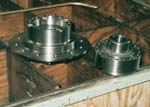
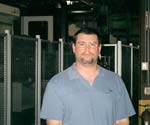
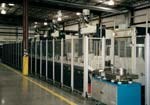
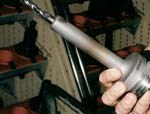
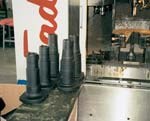









.png;maxWidth=300;quality=90)

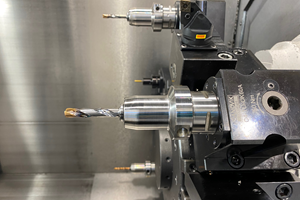
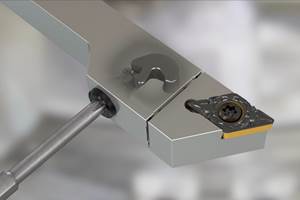
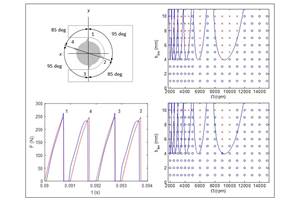
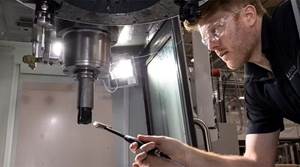



.png;maxWidth=970;quality=90)